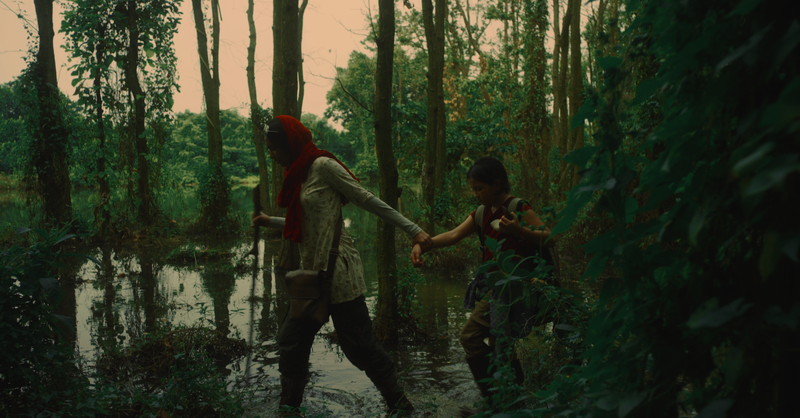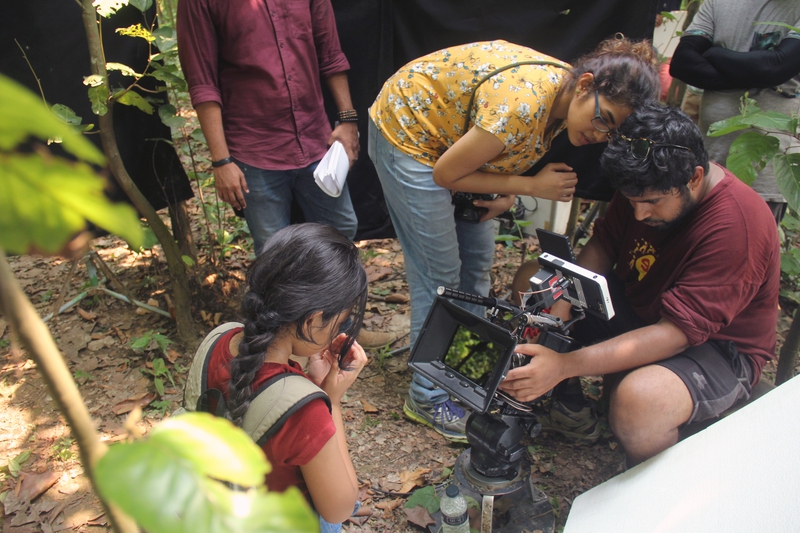After this year’s SXSW, references to The Net will likely not be about the 1995 tech thriller with Sandra Bullock, so apologies to her and fans of the film. In fact, the new net has no connection to computing at all, so apologies to Web3 fans as well. For this occasion, the meaning of “net” goes back to the basics, as in an object made out of strands woven together. Think mosquito nets. That meshed insect-repelling invention is also what you’ll get upon translating the Bengali title of Nuhash Humayun’s horror-drama short Moshari.
Even before its March 13 world premiere at SXSW as part of the Midnight Shorts program—the first from Bangladesh to screen there, per Humayun—people are already talking about Moshari. The talks, in particular, are about turning the short into a feature-length creation, precisely the phase genre titles such as The Evil Dead, Saw, The Babadook, Mama, and more once experienced. As expected, the nitty-gritty of this process isn’t something Humayun could share over the phone (yet), but right now the spotlight is now on his proof-of-concept. At 22 minutes, Moshari follows sisters Apu (Sunerah Binte Kamal, a National Film Award winner) and Ayra (Nairah Onora Saif) as inhabitants of a world where, come nightfall, must stay inside mosquito nets or become food for blood-sucking monsters.

Humayun recalled that he conceived this story while in college. In a way, its roots are traceable to a childhood mystery-slash-fear from all the nights sleeping in a moshari like many fellow South Asians, feeling protected but continuously wondering if danger is just beyond the delicate curtain. “The net kind of traps all the light around it so it glows a little, and you can’t see what’s directly outside,” he said.
Since there is no monster in the closet or under the bed in his culture, Humayun finds Moshari presents an opportunity to make a distinctly Bangla slice of horror. The entire short, which he directed and wrote, takes place in Dhaka. Key cast and crew are homegrown, or even close relations (Saif is Humayun’s niece, Kamal is a friend in the media field). Although Humayun said this only comes forth after the fact, traces of his actual family dynamics with his mother and three sisters are there when Apu and Arya interact.

“My parents separated when I was a kid, and my mom was always so busy because she was at university, so it was sort of like my sisters who raised me,” he said. “That sisterly relationship, I thought there was something interesting there—just exploring ‘What happens when your sister becomes your mother because your parents are too busy or not there?’”
Then there are the monsters (Moyed Bhuiyan is credited as the main one), which collectively result from combining mosquitoes’ traits with vampire lore. The soundscape, chief among it a score full of fleeting woodwinds and strategic rattlings from Dameer Khan, emphasizes the need to muster mood with personal and quality notes above all else. “You wouldn’t want to watch something with shitty sound, especially for horror,” he added, after crediting the video The Importance of Sound from YouTube creator ponysmasher, or David F. Sandberg of Lights Out (which started as a short), for this knowledge.
Most importantly, however, is the rendering of Bangladesh being the last nation standing amid this catastrophe. This specific touch from Humayun, one he’s aware is wish fulfillment-esque, can be looked into as the wrench that disrupts how his home country is commonly perceived: either vulnerable to the elements or deserving of the (now-antiquated) “Third World” designation. “It’s like how Black Panther created an African nation that was never colonized, and that’s a powerful fantasy to have,” he added.
On a more personal level, Humayun said that Moshari could show Dhallywood how fantastical and fun-first stories can be told alongside the more grounded and message-rich ones—and may be just as impactful. In simpler terms, he just wants to see more South Asian horror out in the world. And if you switch out Dhallywood for Hollywood, efforts like Moshari present a cinematic narrative that isn’t about under-represented communities being dealt a bad hand, and offers more than a soirée of stereotypes.
It’s also pure coincidence that Moshari hews so close to the state of the world. Yes, the concept had always had proximity—a stand-in for climate change, said Humayun, of which has been greatly affecting Bangladesh and future generations there—but not to the point where it could be seen as a spin on the global COVID-19 pandemic. One possible (and again, unintentional) deduction is that the mosquito nets bear the same purpose as face masks. “But I think it says a lot that we are always anticipating some sort of disaster, in some form or another, and there’s more to come,” he said.

For now, though, Humayun is elated to be navigating his passion for creative storytelling much like his locally renowned parents, Gultekin Khan and the late Humayun Ahmed. In an interview with the daily newspaper Prothom Alo, he said his mother supported his filmmaking spirit. His father, simply put, was the trailblazer in the realms of Bangla literature and cinema. Both figures unite and propel him to form a portfolio complete with commercials, shorts like his 2018’s Sincerely Yours, Dhaka segment, Moshari, and features.
Besides the extended version of Moshari, the Sundance Institute’s Screenwriters Intensive fellow is also putting together Moving Bangladesh. The first Bangladeshi original project in the program is based on the creation of the country’s first major ridesharing platform, Pathao, and is receiving mentorship from The Spectacular Now’s James Ponsoldt. “When I was applying, so many people told me, ‘Oh, don’t bother, nobody from our part of the world gets into this stuff,” he said.
But hopefully, the progress of the project and Humayun will prove that when you, as an artist, feel right, go ahead and cast your artistic net wider.
Moshari is now playing at SXSW as part of the Midnight Shorts Program, also available to watch as part of the festival's online offerings.






